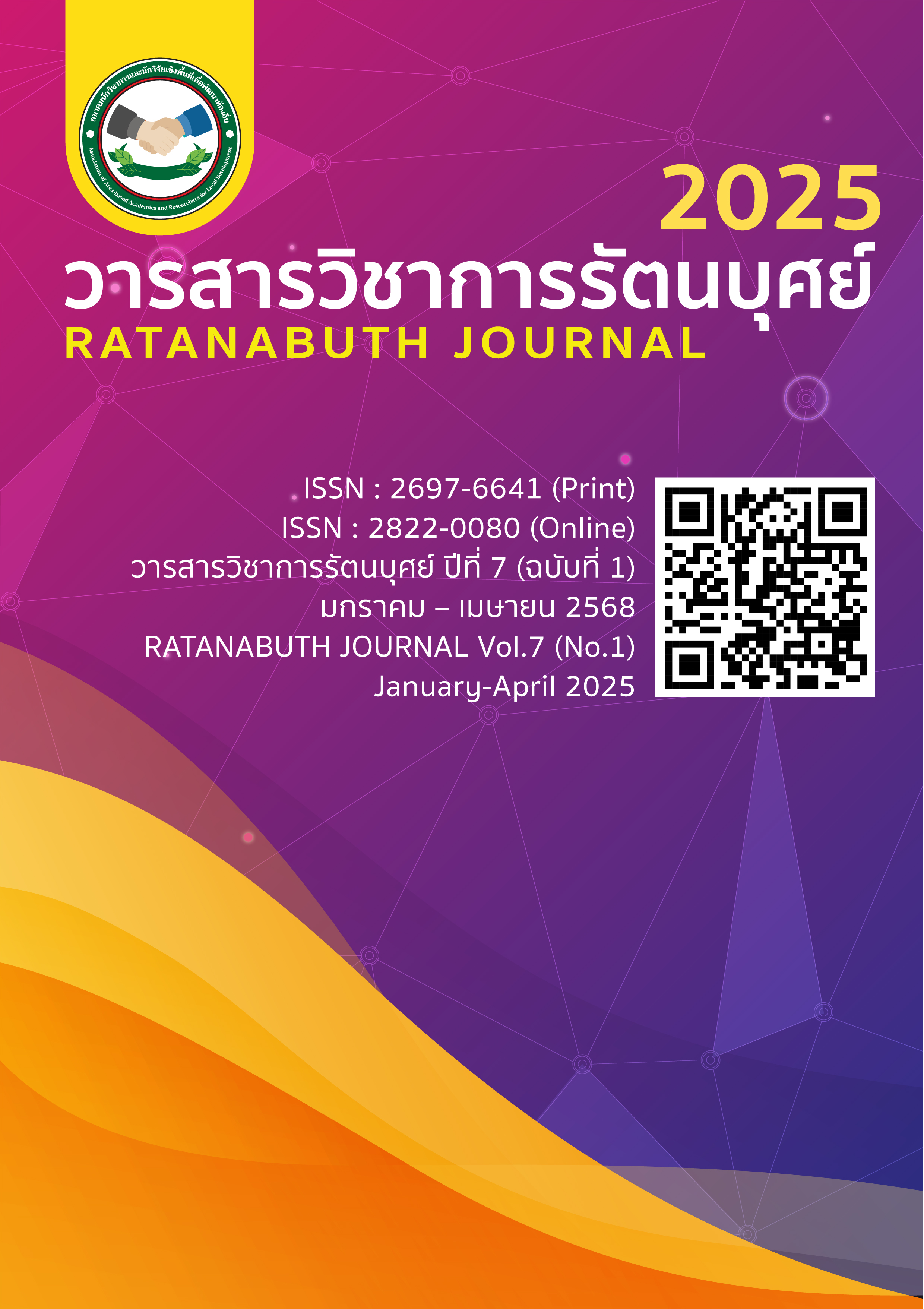Participatory General Administration in Educational Institutions Participatory General Administration in Educational Institutions
Main Article Content
Abstract
Participatory management is a concept that focuses on giving all personnel the opportunity to jointly think, make decisions, and participate in various activities of the educational institution. In practice, many problems are still found that are obstacles to effective management, such as the problem of participation of many personnel, still lacks understanding of the principles and importance of participatory management. Some of them have regular workloads to the point where they are unable to fully participate in the activities. Some people lack motivation to participate or have negative attitudes towards change, causing them not to cooperate as they should. Participatory general administration in educational institutions It is the organization of the educational institution administration system. To achieve the standards, quality and goals set. By coordinating promotion, support, and facilitation. In providing all forms of educational services Aiming at developing educational institutions in the appropriate use of innovation and technology. In which educational institution administrators should apply 2 principles to management as follows: 1) Principles of general management in 3 areas: (1) structural aspect relationships between educational institution administrators and personnel in the educational institution according to the hierarchy of the chain of command. (2) Duties: define roles, duties, and responsibilities of personnel to match the work. (3) Practical aspect: Administrative processes in which personnel must work together. In order for the work to be successful according to the goals and 2) General principles of participatory management are (1) participation in decision making (2) participation in operations participating in management and coordination (3) participation in material, social, and personal benefits 4) participation in evaluation control and monitoring of all activities.
Therefore, participation in various processes will create strong cooperation that can solve problems effectively. It has a positive effect on the development of educational quality. as well as creating a continuous and serious monitoring and evaluation system. To achieve long-term sustainable change.
Article Details

This work is licensed under a Creative Commons Attribution-NonCommercial-NoDerivatives 4.0 International License.
References
กระทรวงศึกษาธิการ. (2556). คู่มือการบริหารโรงเรียนในโครงการพัฒนาการบริหารรูปแบบนิติบุคคล. กรุงเทพมหานคร: กลุ่มวิจัยและพัฒนานโยบาย สำนักโยบายและแผนการศึกษาขั้นพื้นฐาน.
กรมวิชาการ กระทรวงศึกษาธิการ. (2546). แนวทางการจัดกิจกรรมพัฒนาผู้เรียนตามหลักสูตรการศึกษาขั้นพื้นฐาน พุทธศักราช 2544. กรุงเทพมหานคร: โรงพิมพ์คุรุสภาลาดพร้าว.
กมลทิพย์ ใจเที่ยง. (2563). การบริหารองค์กรแห่งความสุขในโรงเรียนประถมศึกษา. วารสารศึกษาศาสตร์ มหาวิทยาลัยศิลปากร, 18(2), 74–93.
เกษมศรี จาตุรพันธ์. (2554). การบริหารแบบมีส่วนร่วมกับธรรมาภิบาลของสถานศึกษา สังกัดสำนักงานเขตพื้นที่การศึกษาสมุทรสาคร.วิทยานิพนธ์ปริญญามหาบัณฑิต. กรุงเทพมหานคร: มหาวิทยาลัยศิลปากร.
จันทรานี สงวนนาม. (2545). ทฤษฎีแนวปฏิบัติการบริหารสถานศึกษา. กรุงเทพมหานคร: บุ๊คพอยท์.
จันทรานี สงวนนาม. (2555). ทฤษฎีและแนวปฏิบัติในการบริหารในสถานศึกษา. กรุงเทพมหานคร: บุ๊คพอยท์.
ชำนาญ อุดมนิวิ. (2558). แนวทางการมีส่วนร่วมในการบริหารสถานศึกษาของคณะกรรมการสถานศึกษาขั้นพื้นฐาน สังกัดสำนักงานเขตพื้นที่การศึกษามัธยมศึกษา เขต 27.วิทยานิพนธ์ กศ.ม. การบริหารการศึกษา. มหาสารคาม: มหาวิทยาลัยมหาสารคาม.
ประสาร พรหมณา. (2553). การบริหารแบบมีส่วนร่วม. สระแก้ว: โรงเรียนบ้านพรหมนิมิตร.
ปรียาพร วงศ์อนุตรโรจน์. (2553). การบริหารงานวิชาการ (พิมพ์ครั้งที่ 5). กรุงเทพมหานคร: ศูนย์สื่อเสริมกรุงเทพมหานคร.
ภารดี อนันต์นาวี. (2557). หลักการ แนวคิด ทฤษฎีทางการบริหารการศึกษา. กรุงเทพมหานคร: สำนักพิมพ์มนตรี จำกัด.
ยุทธนา ล้ำเลิศ. (2565). แนวทางการพัฒนาการบริหารงานทั่วไปแบบมีส่วนร่วมของสถานศึกษาสังกัดสำนักงานเขตพื้นที่การศึกษาประถมศึกษาพระนครศรีอยุธยา เขต 1.ครุศาสตรมหาบัณฑิต สาขาวิชาการบริหารการศึกษา. พระนครศรีอยุธยา: มหาวิทยาลัยราชภัฏพระนครศรีอยุธยา.
ศิริวรรณ เสรีรัตน์, และคณะ. (2545). ทฤษฎีองค์การ. กรุงเทพมหานคร: ธรรมสาร จำกัด.
สันติ บุญภิรมย์. (2553). นวัตกรรมการบริหารการศึกษา (พิมพ์ครั้งที่ 2). กรุงเทพมหานคร: บุ๊คพอยท์.
สำนักงานเลขาธิการสภาการศึกษา กระทรวงศึกษาธิการ. (2560). แผนการศึกษาแห่งชาติ พ.ศ. 2560–2579 (พิมพ์ครั้งที่ 1). กรุงเทพมหานคร: สำนักงานเลขาธิการสภาการศึกษา.
อัจฉรา จงดี. (2560). การศึกษาบทบาทการมีส่วนร่วมในการบริหารสถานศึกษาของคณะกรรมการสถานศึกษาขั้นพื้นฐานในจังหวัดจันทบุรี ระยอง และตราด.วิทยานิพนธ์ครุศาสตรมหาบัณฑิต สาขาวิชาการบริหารการศึกษา. จันทบุรี:มหาวิทยาลัยราชภัฏรำไพพรรณี.
Fowler, A. (1982). An introduction to the theory of genres and modes. Harvard University Press.
Brown, W. B., & Moberg, D. J. (1998). Organizational theory and management: A macro approach. New York: John Wiley & Sons.
Candoli, I. C., Bents, R. T., & Duke, D. L. (1992). School business administration: A planning approach (4th ed.). Massachusetts: Allyn & Bacon.
Cohen, A. R., & Uphoff, N. T. (1980). Effective behavior in organizations. New York: Richard D. Irwin Inc.
Fayol, H. (1916). General and industrial management. Paris: Institute of Electrical and Electronics Engineering.
Koontz, H., O'Donnell, C., & Weihrich, H. (1984). Management. Auckland: McGraw-Hill.


